What Are Earthquakes Called On Other Planets?
Earthquakes are daily occurrences all over planet Earth. They happen due to shifts in the tectonic plates that make up the earth's crust. These plates can crash together, split apart, or slide against each one another. Earth is currently the only known planet which is made up of tectonic plates. However, other planets experience shakes and tremors as well (via Eos).
Despite having no tectonic plates, Mars does experience seismic activity. Last month, a report from The New York Times revealed that scientists have seen thousands of tracks on Mars created by tumbling boulders. There are piles of sand along the tracks, indicating the paths from the rocks. Given that the tracks fade due to wind gusts, scientists can assume that any visible tracks are from recent movements. As on Earth, rocks move because of seismic activity.
Mars has seismic activity
Scientists at NASA previously detected movement on Mars in 2021 using a seismometer, but nothing notable had registered on the equipment for two years. That makes the 2021 activity and recent boulder tracks even more intriguing, because Mars was long thought to be "a cold, dead planet," as explained by Brown University researcher Ingrid Daubar (via The New York Times). But do these activities have a name?
The Smithsonian shared a NASA report wherein these activities are referred to as "marsquakes." Space.com reported that scientists hope to use new technologies to investigate the possibility of "venusquakes." Balloons filled with barometers, for example, detected earthquakes in California. Due to the hot surface of the planet, nothing has been able to land on Venus for more than an hour or two. Perhaps the balloon method could one day be a solution to the elusive "venusquake."
In a list of seismic movements in our solar system provided by Eos, Saturn is the only other planet with seismic movement. Its rings act as the planet's own seismometer. The wave structures within the rings are sensitive to Saturn's vibrations, thus revealing the internal activity of Saturn.

